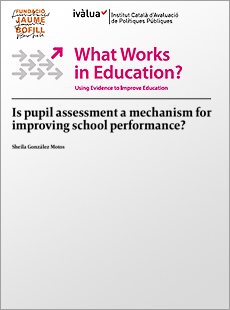Assessment has traditionally been understood as the evaluation that teachers conduct regarding what their pupils have learned. Today, assessment is no longer a purpose-driven tool (for giving marks) and has become something more complex: another resource for learning.
However, the breadth and variety of tools for assessments suggests that we investigate and reflect on which practices have a greater impact. This review of the evidence aims to provide information that can help us to find out if educational assessments are tools for improving pupils’ performance in school, discover which assessment mechanisms are more effective in improving academic results and learn which pupil profiles benefit the most from implementing the different strategies of evaluation in the classroom.



